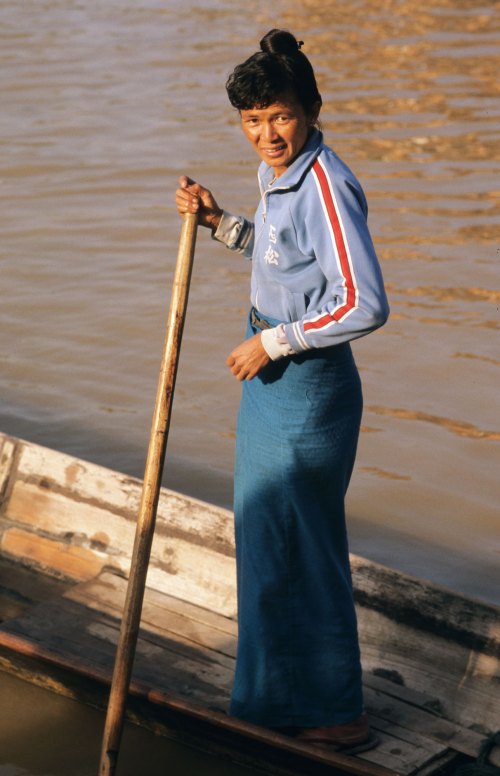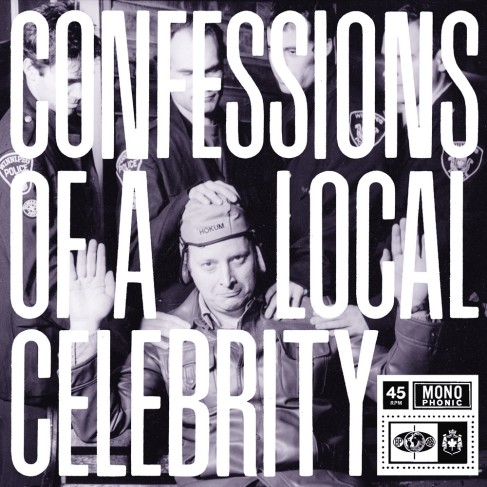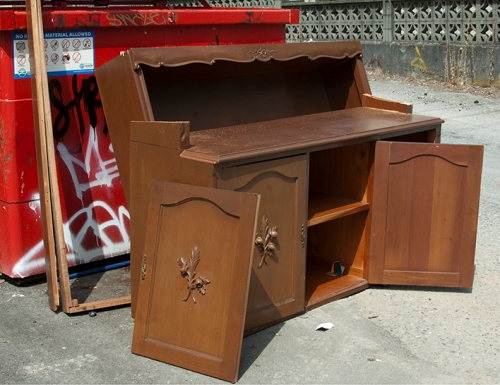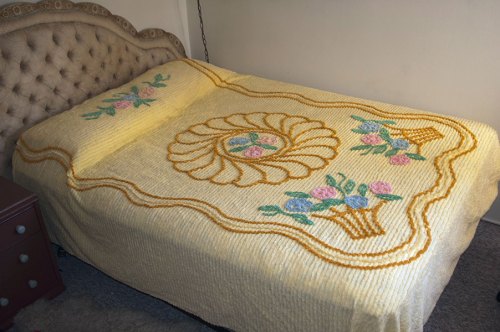
Ma Kyi Nnunt, my Burmese friend, wears a retro track jacket hipsters would kill for.
A few years ago – all right, it was like 15 years ago – I spent a month in Burma. I loved it. I wrote this account of something that happened there, but it never got published anywhere. So I thought, why don’t I publish it on my blog? Then I remembered my blog is supposed to be about being cheap. Then I remembered that Burma is the most inexpensive place I’ve ever been. In one month I spent $125. No joke. And it cost me about $100 to get to and from there from Bangkok by air. Cheap, right? All right then, here we go:
Her name was Ma Kyi Nyunt. She was 37, thin and straight, and her black hair, streaked with white, was pinned into a bun on the crown of her head. She wore a traditional Burmese sarong and an Adidas-style polyester track jacket, such as what was all the rage in the West a few years ago. But Ma Kyi Nyunt had no idea about what was in and what was out in the world of fashion. She was just trying to survive.
She lived on the canal leading to Inle Lake, a serene, ethereal body of water where tourists were chugged out at dawn in speed boats to see the fishermen row their boats with their legs, one leg wrapped around the oar while they perched with the other on the sterns of their little wooden crafts.
Early one morning I was walking along the canal taking pictures. I sat down on a dock to change the film in my camera and noticed a woman in a tiny rowboat coming towards me. When she got close, she asked me in halting English if I wanted to take a tour of her village. I said no thanks and finished loading my film. She brought her boat alongside the dock and stepped up onto the dock, and sat beside me as if we were old friends.
She asked me who I was and where I was from. She said she lived just across the canal and that she made her living taking tourists to the special places in her village. She had such quietude about her and such an easygoing, unassuming demeanor, that I changed my mind and told her I would love to see her village.
We got into her boat and she rowed us across to her home, an airy wooden house on stilts. It looked like a giant crate and the windows had shutters but no glass. The toilet was outside, a hole in the ground surrounded by woven reed mats for privacy. The toilet paper was pages torn out of an old English novel.
She invited me inside her house and we sat on the floor, as there was no furniture. She showed me pictures and postcards that tourists had given her as gifts, and a photo of an Italian named Giorgio whom she called her boyfriend.

Ma Kyi Nnunt (back) and her mother in their little wooden boat on the canal leading to Inle Lake.
Ma Kyi Nyunt told me she was the main breadwinner in her family. Her father was dead. Her oldest brother had had a boating accident the previous year that left him unable to walk, and he earned a little money by weaving baskets, which he did sitting cross-legged on a mat underneath the house. Her other brother tilled a piece of land just up the canal, but the land itself belonged to someone else. Her mother, who was in her 60s, had stomach problems and couldn’t do any kind of labour.
While we were talking, Ma Kyi Nyunt often looked out the window that faced the canal. She told me this was how she spotted tourists. If she saw someone walking along the canal, she would get into her little boat and row across to them, just as she had done with me. But Ma Kyi Nyunt’s glances on this day were furtive, and she had a worried look on her face.
She told me the previous day she had taken a French tourist out on her boat. She brought him to see the Buddhist temple in her village, the animist shrines, the cigar rolling factory and finally the papaya plantation. There, amid the protection of the papaya trees, he grabbed her and asked her how much she charged for an hour of sex. She pulled away from him and said she wasn’t a prostitute. He persisted, but she managed to stave him off.
As she told me the story she began to cry. She was so distraught she could barely get the words out. She insisted he hadn’t done anything more than grab her by the arm, but I wasn’t so sure.
No sooner had she finished relating her story than she looked again out the window, and in a voice devoid of emotion said, “There he is.” I jumped up and peered out the window, and sure enough, there was a middle-aged, paunchy man standing across the canal looking at her house.
I shouted at him, “What do you want?”
“Is she there?”
“You stay away the hell away from her,” I screamed, “and if you don’t, I’ll call the police.”
He didn’t move. “I want to talk to her.”
I let out a string of curse words and threats so vitriolic he didn’t dare say anything back. He shrugged and reluctantly turned and walked back toward town.
Ma Kyi Nyunt thanked me in a small voice and said it was time for us to take the tour.
She took me to the animist shrines, where the people made offerings of fruit and prayed to the nats, or animist spirits. We visited the tiny Buddhist temple, where a white-faced Buddha sat peacefully on top of his altar in a nest of incense sticks, and the cigar rolling factory, where young girls and old women sat shoulder-to-shoulder on the ground hand-rolling cheroots.
We walked to the boat and Ma Kyi Nyunt put on a conical rice-picker’s hat, and gave me one to wear, too, against the burning sun. I sat in the boat and she got up on the stern, and began rowing with her leg.
We travelled up the canal until we got to the papaya plantation, the scene of her shameful encounter with the Frenchman. On this day it was just her and me, and row upon row of green leafy trees dripping with still-green fruit. This was the end of the tour.
When Ma Kyi Nyunt took me back to the dock where she’d found me, I tried to pay her for the tour, but she shook her head and started to cry, waving away the bills in my hand.
“No,” she said. “You are my sister.”
Two days later, I went back to see Ma Kyi Nyunt. I walked back up the canal, this time my arms full of bags of fruit and cookies. I stood across from her house and waited. Her mother saw me and rowed across in the little wooden boat, and took me back with her. She was delighted with the fruit and cookies, not because she wanted to eat them, but because she had something to offer the nats. She communicated this to me through smiles and gestures, her English as lacking as my Burmese.
She took the things into the house and emerged with a rice picker’s hat, which she gave me to put on. She got back into the boat and we travelled up the canal, and after a few minutes she brought the boat alongside the bank. We got off where there were some men tilling land under the hot sun, and I understood that we had come to see her son, the one working the fields that were not his. His mother gave him a tin bucket containing his lunch, and I smiled and shook his hand.
As we were heading back to the boat, Ma Kyi Nyunt appeared. Somehow she’d heard I was there – perhaps a neighbour had told her – and she’d come to find me. The three of us went back to the family’s airy wooden house on stilts. Her mother fed me a simple but tasty meal of vegetables, curry and rice, and of course tea, which is as popular in Burma as it is in China. When Ma Kyi Nyunt left the room to look for some pictures she wanted to show me, I took money out of my pocket and tucked the folded bills between the pages of a book that was lying on the floor. I put more money under the little rug I was sitting on.
When she came back into the room I asked her if the Frenchman had returned. She said no. She also said that all of her neighbours had heard me scream at him that day. I couldn’t tell if she was mortified or grateful.
I left Inle Lake two days later, and Burma soon after. I sent one letter to Ma Kyi Nyunt, but I don’t know if she ever got it. I wondered if Giorgio, her Italian boyfriend, had come back to fetch her and whisk her off to Europe, like he’d promised. I doubted it. The world is full of romantic-minded travellers who promise to pull the less fortunate out of the morass of poverty and repression, but never make good on it. Also, it is next to impossible for a Burmese to get a passport.
At that time, Aung San Suu Kyi, the leader of the National League for Democracy, was still under house arrest in Rangoon. She urged tourists not to visit Burma, as an act of protest against the brutal military dictatorship that ruled this hermetic, deeply religious country.
I felt pangs of guilt when I booked my plane ticket there from Bangkok. But when I met Ma Kyi Nyunt, who depended on tourists to help her and her family survive, I saw things in a whole new light. I hope the money I left in the book and under the rug brought them food, or offerings for the nats, or new conical hats to wear while rowing the boat. But mostly I was happy I’d been there to scare off the Frenchman, who had so callously assumed that because she was a poor woman living in a poor country, Ma Kyi Nyunt would be willing to sell her body to make a buck.










